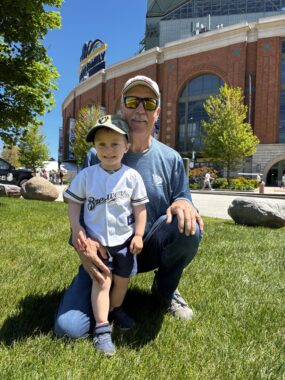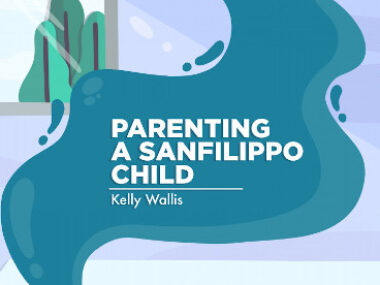Trying to meet my son’s needs so he doesn’t feel like a ‘glass child’
How we're ensuring our family's 'super sibling' gets his share of attention
Written by |

It wasn’t until I started sharing the story of my daughter, Liv, and her Sanfilippo syndrome on social media that I heard the phrase “glass child” for the first time. I’d posted about how special Liam, Liv’s brother, is. Someone commented on my post, reminding me to pay extra attention to him so he doesn’t feel like a “glass child.”
I’ll be honest: I had to Google it. What I found is that the term “glass child” describes a sibling of a child with a chronic illness, disability, or behavioral issue whose needs are often overlooked or minimized by parents. “Glass” here suggests that these children are often treated as transparent or invisible while parents are focused on the child with special needs.
My first reaction to the reader’s comment was, “Well, of course I’ll pay Liam extra attention!” But as I continued to share tales about Liv and how much time and energy we invest in her, I’d see comments of that sort continue to pop up here and there. A lot of them were from siblings of special needs kids, whom I’ll refer to as “super siblings.” It was clear that they felt ignored or even traumatized by the experience of having a sibling with complex needs.
While I realize that not every super sibling feels that way, the comments led me to a defining moment: I vowed that Liam would never feel like a “glass child.”
After getting Liv’s diagnosis, I wondered how it’d affect her brother. Initially people comforted me by saying things like, “He’ll become such a patient, caring, loving, inclusive kid.” And shortly afterward, I watched a video conference where they had Sanfilippo siblings talk about their lives; they all seemed to be great kids doing great things. So truthfully, a month or two after Liv’s diagnosis, I never thought too much more about the subject until I saw those comments on my social media page.
Shifting my focus

Erin Stoop and her son, Liam, at the Milwaukee airport. (Courtesy of Erin Stoop)
Given Liv’s hyperactivity and inability to sit still for a craft or game, my husband, Tyler, and I often have to divide and conquer when doing things with the kids. It’s pretty difficult to all play a game, watch a movie, or even eat together nicely. So often, Tyler will run around with Liam while I watch a show with Liv.
I realized that one-on-one time with Dad wasn’t enough, though; it’s just our daily grind. I realized then that I needed to step up my game.
Over the past few months, I’ve done specific things with just Liam and attempted to spoil him in some ways. For instance, I took him to Florida for a four-day getaway to visit his grandparents at the beach, and he enjoyed being the center of attention.
Once I did a “day date” with Liam when we picked out a toy at Walmart, went to dinner, and got ice cream. I also took him to a pro baseball game with my dad. And just last month, I took him to a Mother’s Day event where he got to indulge in doughnuts, juice, and a bounce house without me running around after Liv. All eyes were on him, and he loved it.

Liam and his grandpa at a Milwaukee Brewers baseball game. (Courtesy of Erin Stoop)
I know that given our situation, Liam will learn to be patient, kind, and respectful. But the last thing I want is for him to feel he doesn’t get as much of our attention, just because he doesn’t have a problem like Liv’s.
But I have to be careful. As a parent, I have to find a balance, right? I cannot show him too much attention or give him too many treats to the point where he becomes spoiled.
Parenting is harder than I ever imagined it could be. And parenting a special needs child is a curveball I wasn’t ready for. But no parent is ready for that. And no parent is ever fully prepared. There’s no onboarding or orientation to make us ready. You learn on the job, starting on day one.
I am learning, and sometimes making mistakes, but I’m attempting to be the best mom to both Liv and Liam as I can possibly be.
Note: Sanfilippo News is strictly a news and information website about the syndrome. It does not provide medical advice, diagnosis, or treatment. This content is not intended to be a substitute for professional medical advice, diagnosis, or treatment. Always seek the advice of your physician or other qualified health provider with any questions you may have regarding a medical condition. Never disregard professional medical advice or delay in seeking it because of something you have read on this website. The opinions expressed in this column are not those of Sanfilippo News or its parent company, Bionews, and are intended to spark discussion about issues pertaining to Sanfilippo syndrome.






Ally G.
You’re doing a beautiful job! Thank you for sharing your truth. <3